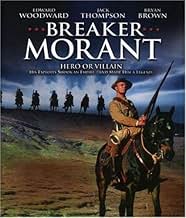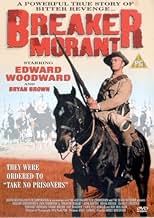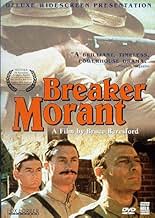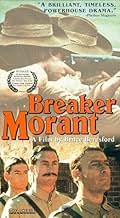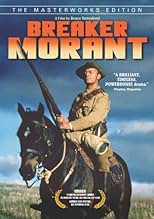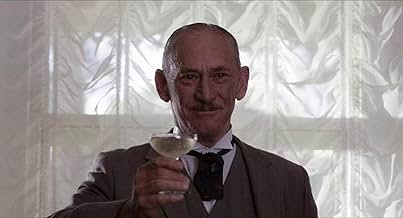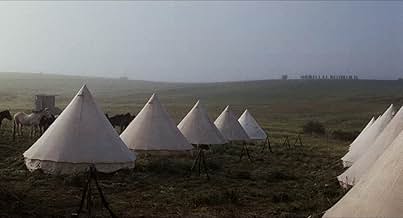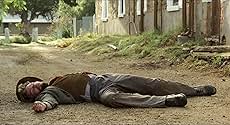IMDb RATING
7.8/10
15K
YOUR RATING
Three Australian lieutenants are court martialed for executing prisoners as a way of deflecting attention from war crimes committed by their superior officers.Three Australian lieutenants are court martialed for executing prisoners as a way of deflecting attention from war crimes committed by their superior officers.Three Australian lieutenants are court martialed for executing prisoners as a way of deflecting attention from war crimes committed by their superior officers.
- Nominated for 1 Oscar
- 13 wins & 8 nominations total
Charles 'Bud' Tingwell
- Lt. Col. Denny
- (as Charles Tingwell)
Featured reviews
(Note: Over 500 of my movie reviews are now available in my book "Cut to the Chaise Lounge or I Can't Believe I Swallowed the Remote!" Get it at Amazon.)
The question raised in this film is the same as that raised in the Nuremberg trials following World War II and at the trial of Lt. William Calley during the Vietnam War, namely should a soldier be punished for following orders?
The answer to that question depends not only on what the orders were--that is, were they legitimate orders consistent with the "rules of war"--but also on who is asking the question and why they are asking it. After WWII the Allies asked the question and the reason they asked it was because so many people were horrified by Nazi atrocities and wanted someone to punish. If the Axis powers had somehow won the war they might have tried US President Harry S Truman and others for the atomic bombings of the Japanese cities, or indeed for the fire bombings of Dresden. In Vietnam we asked the question of ourselves during the war because our government and military were being accused both at home and abroad of waging a unjustified war and going against our own value system.
Here the story goes back to the Boer War a hundred years ago in South Africa, as the British command for political reasons puts Lt. Breaker Morant, an Australian soldier fighting with the British forces, and two of his fellow Bushveldt Carbineers on trial for shooting Boer prisoners. Their defense is the same as the Nazi soldiers and that of Lt. Calley: they were just following orders.
The superb direction by Bruce Beresford (from the play by Kenneth Ross) makes us identify with Morant (Edward Woodward), Lt. Peter Handcock (Bryan Brown) and the third soldier because we can see that the horrors of war pervert the usual logic of right and wrong so completely that we can appreciate what drove them to do what they did. Jack Thompson, playing defense attorney Major J. F. Thomas, expresses this when he tells the court that war changes us and that therefore the usual rules of conduct no longer apply. Incidentally this film is based on actual events.
Regardless of which side of this very vexing question you come down on, I can promise you will enjoy this outstanding film, winner of 10 Australian Film Institute Awards. In the annuals of war films and courtroom dramas this ranks with the best of them.
The question raised in this film is the same as that raised in the Nuremberg trials following World War II and at the trial of Lt. William Calley during the Vietnam War, namely should a soldier be punished for following orders?
The answer to that question depends not only on what the orders were--that is, were they legitimate orders consistent with the "rules of war"--but also on who is asking the question and why they are asking it. After WWII the Allies asked the question and the reason they asked it was because so many people were horrified by Nazi atrocities and wanted someone to punish. If the Axis powers had somehow won the war they might have tried US President Harry S Truman and others for the atomic bombings of the Japanese cities, or indeed for the fire bombings of Dresden. In Vietnam we asked the question of ourselves during the war because our government and military were being accused both at home and abroad of waging a unjustified war and going against our own value system.
Here the story goes back to the Boer War a hundred years ago in South Africa, as the British command for political reasons puts Lt. Breaker Morant, an Australian soldier fighting with the British forces, and two of his fellow Bushveldt Carbineers on trial for shooting Boer prisoners. Their defense is the same as the Nazi soldiers and that of Lt. Calley: they were just following orders.
The superb direction by Bruce Beresford (from the play by Kenneth Ross) makes us identify with Morant (Edward Woodward), Lt. Peter Handcock (Bryan Brown) and the third soldier because we can see that the horrors of war pervert the usual logic of right and wrong so completely that we can appreciate what drove them to do what they did. Jack Thompson, playing defense attorney Major J. F. Thomas, expresses this when he tells the court that war changes us and that therefore the usual rules of conduct no longer apply. Incidentally this film is based on actual events.
Regardless of which side of this very vexing question you come down on, I can promise you will enjoy this outstanding film, winner of 10 Australian Film Institute Awards. In the annuals of war films and courtroom dramas this ranks with the best of them.
Truly great drama based on a real story. The camerawork is simple & not flashy, allowing the great script & magnificent ensemble cast to shine. There isn't one weak acting performance in this film, the standouts being Jack Thompson (in my opinion, his best ever performance)& Woodward in the role of "Breaker" Morant. Gripping drama that has aged well over 23 years. A must see 9/10.
When I watched this finely acted movie, I wasn't really too knowledgeable about the Boer War so I didn't know how historically accurate the film was. However, from reading the posts, it seems more knowledgeable posters then myself agree that the filmmakers were very authentic in their endeavors. Most pertinently, even though the story is about the General Staff scapgoating the three Australian lieutenants to cover their own practice of ordering Boer prisoners shot, in a war obviously long since concluded, its relevance is timeless and universal as soldiers in all times and places are asked to do things that conflict with their consciences. Breaker Morant shows this very powerfully. 9/10.
It's one of the most delightful experiences to watch a movie you know completely nothing about and it turns out to be one of the best surprises in a long time. This was the case with "Breaker' Morant". I dont even know why I bothered to watch it, since it sounded like a truly boring Australian war movie, but boy was I wrong and consequently glad I DID bother. Some of the acting and the script are truly Oscar-worthy and the photography and camera movements were truly outstanding on many occasions, taking the whole movie onto another level of experience. And not to forget, the poetry recited through the movie is brilliant. I wonder if it truly got published. 8/10
10davidg2e
This is a remarkable film that remains as fresh as when it was produced. Edward Woodward has always been a favorite of mine and he was masterful as the title character. He seems incapable of giving any less than a strong performance in a variety of roles. "The Wicker Man" comes to mind, as well as the many episodes of "The Equalizer."
It is easy to imagine the conflicts that inevitably occur between military superiors and the men on the front, and this film clearly shows that, in those days, command personnel were much more likely to be obeyed without question, even as the enlisted men suffered for their mistakes, errors of judgment or even criminality.
For me, the frosting on the cake was using Woodward to sing "Soldiers of the Queen" during the roll of the credits. His clear and fine singing voice seemed to taunt the military brass. It is a crackerjack movie and NOT a tear-jerker, despite the story line.
It is easy to imagine the conflicts that inevitably occur between military superiors and the men on the front, and this film clearly shows that, in those days, command personnel were much more likely to be obeyed without question, even as the enlisted men suffered for their mistakes, errors of judgment or even criminality.
For me, the frosting on the cake was using Woodward to sing "Soldiers of the Queen" during the roll of the credits. His clear and fine singing voice seemed to taunt the military brass. It is a crackerjack movie and NOT a tear-jerker, despite the story line.
Did you know
- Trivia"We shot them under Rule 303" is a reference to the.0.303 inch (7.7 millimetre) cartridge used in British Army rifles.
- GoofsThe band plays an excerpt from Franz Lehár's The Merry Widow, which premiered three years after the trial took place.
- Quotes
[last lines]
Harry Morant: Shoot straight, you bastards. - Don't make a mess of it!
- Crazy creditsIntroducing Lewis Fitz-Gerald as George Witton.
- SoundtracksAt Last
Traditional tune
Arranged by Jack Grimsley (uncredited)
Lyrics by H.H. Morant
Performed by Edward Woodward
- How long is Breaker Morant?Powered by Alexa
Details
- Release date
- Country of origin
- Official site
- Languages
- Also known as
- 'Breaker' Morant
- Filming locations
- Cactus Farm, Burra, South Australia, Australia(deserted farmhouse, Boer attack)
- Production companies
- See more company credits at IMDbPro
Box office
- Budget
- A$800,000 (estimated)
- Gross worldwide
- $948
Contribute to this page
Suggest an edit or add missing content


